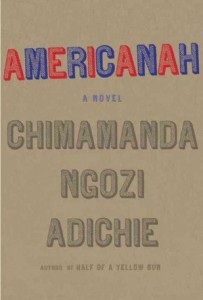Authors weigh in on their favorite page-to-screen adaptations
The opening of the latest film version of The Great Gatsby has focused interest on adaptations of books into movies. Here authors Dennis Lehane, Chuck Palahniuk, Judy Blume, Bret Easton Ellis, Warren Adler, and Kelly Oxford discuss “the times Hollywood got it right.”
A Nigerian-‘Americanah’ Novel About Love, Race And Hair
An interview with Nigerian author Chimamanda Ngozi Adichie about her latest novel, Americanah.
Chimamanda Ngozi Adichie has much of interest to say in this interview, especially about the immigration of Nigeians into the United States and the United Kingdom. But I found particularly eye-opening her own experience with stereotyping:
“I sometimes wonder whether we should change the terminology and instead of talking about race, maybe just talk about skin color, because Ifemelu didn’t really think of herself in terms of her skin color when she was in Nigeria. So coming to the U.S. and discovering that she was black was an entirely new thing. And it’s quite different from being in Nigeria and knowing that there are tensions between Igbo and Yoruba and Hausa. It’s a very different thing. But you know, what’s, I think, particularly absurd about race is how immediate it is. That it doesn’t matter what your history is, what your — it’s really about how you look.
“And I’ll tell you a story. So when I first came to the U.S., much like Ifemelu, I just didn’t think of myself as black. And I wrote an essay in class, and my professor wanted to know who ‘A-dee-chee’ was — Americans often call me ‘A-dee-chee,’ and often tell me that my name makes them imagine that I might be Italian. And so when I raised my hand, because, you know, ‘Who wrote the best essay? This is the best essay; who’s A-dee-chee?’ I raised my hand. And on his face, for a fleeting moment, was surprise. And I realized that the person who wrote the best essay in the class was not supposed to look like me. And it was quite early on in my time in the U.S., but it was just sort of that very tiny moment where I realize, ‘Oh, right, so that’s what this is about.’ “
Sookie Stackhouse author receiving death threats
In a case of life imitating the art of Stephen King’s Misery, CBC Books reports that author Charlaine Harris has been receiving death threats:
Charlaine Harris’s bestselling Sookie Stackhouse novels, the basis for the hugely popular HBO TV series True Blood, has inspired a legion of devoted fans, but some of those fans have turned on the author — even threatened her life — after the ending of the final book of the series was leaked.
Dead Ever After, the 13th and final novel in the series, was released this week, but one reader in Germany managed to receive an advance copy and posted major spoilers on Amazon in April.
Southland, one of the best dramas on TV, deserves to be renewed
We could all stand to purge a few cop shows from the nation’s collective television diet, but TNT’s Southland isn’t one of them.
I couldn’t agree more.
Choice Critical for Promoting Reading, Says Canadian Study
Publishers Weekly reports on a study commissioned by the National Reading Campaign in Canada. The study focused “on ways to build a nation of people who love to read, as opposed to literacy strategies to ensure that the population can read.”
Study results, released last week, were “that giving people choice and control over what they read as well as in related social interactions are key factors in instilling a love of reading.” Working in groups is particularly important for developing literacy among teens, the study found. Sharon Murphy, associate professor of education at York University in Toronto and author of the study report, wrote that there are “many long-term societal benefits associated with being a nation of avid readers, including increased civic engagement, empathy for others, and improved cognitive and academic development.”
Do Readers Judge Female Characters More Harshly Than Male Characters?
In an April 29 interview with Claire Messud, Publisher Weekly’s Annasue McCleave Wilson wondered whether Messud would want to be friends with her protagonist, Nora. Nora was, after all, just so very angry, “almost unbearably grim.”
“For heaven’s sake, what kind of a question is that?” Messud shot back (understandably), proceeding to rattle off any number of unpleasant male protagonists, from Philip Roth’s Mickey Sabbath to Dostoyevsky’s Roskolnikov, about whom, one presumes, no one would even think to ask such a question. “If it’s unseemly and possibly dangerous for a man to be angry,” Messud says, “It’s totally unacceptable for a woman to be angry.”
On the basis of this interview, Maria Konnikova examines two key questions:
First, do people treat male and female literary characters differently? That is, are readers actually more inclined to evaluate female, as opposed to male, protagonists on the basis of their potential as friendship material? And second, gender issues aside, what kind of a question is that, anyway—a legitimate one, or, in essence, a fairly dumb one? Should we be going to literature to look for potential friends in the first place?

